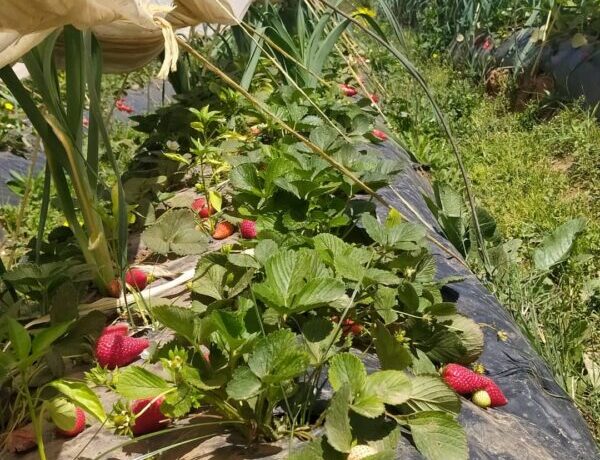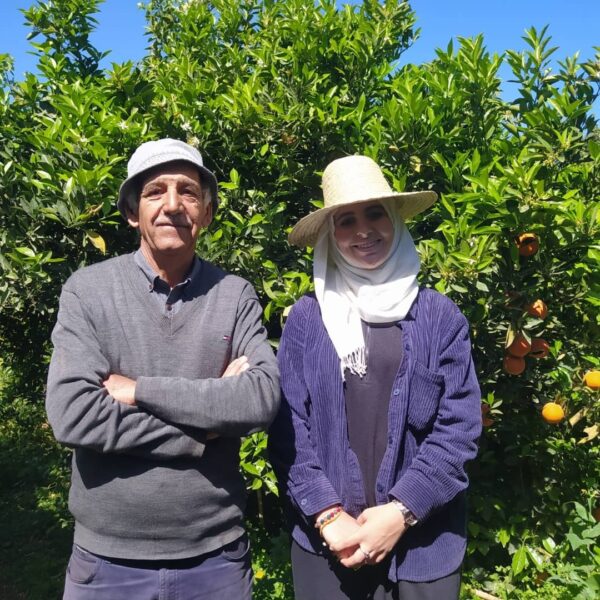Organic farming struggles to develop in Algeria despite the significant potential of this country in terms of availability of arable land and water. In recent years, initiatives for organic farming have been launched, especially through programs developed by the associative movement. It is within the Torba association that Faïrouz and Amira, fresh out of university, have embarked on working the land. After 5 years of hard work, they have managed to produce "100% natural" fruits and vegetables.
At the foot of the Sahel hills, the main agricultural region of the west coast of Algiers, Mahtout Fairouz and Messous Amira practice daily work on the land. The two young women proudly display their status as fellahates (female farmers). Their adventure began almost by chance in 2018, during their final year of university. Amira and Fairouz worked together to obtain a master's degree in biodiversity. It was during a presentation on sustainable agriculture by another group of students that they heard about the Torba association. "Amira had kept this name in mind. After graduating, we went to meet them. By joining the association, we were introduced to permaculture. Everything was new to us," explains Fairouz while checking the size of the pods in her small bean plantation. Soon after, they decided to rent a 27m² plot in Torba's shared garden. These few square meters would become their "experimental field" where they applied all the knowledge gained during the training sessions organized by the association.
Achour's sponsorship
Faïrouz acknowledges that it was her friend who came up with the idea to switch to organic fruit and vegetable production. "She believed that we were ready to manage a farm. But we had a serious problem, we needed land," notes Faïrouz. The two future farmers decide to contact Achour, who had trained them in arboriculture. A former engineer in the oil industry turned to agriculture, he agrees to graciously host them on his farm located in Sahel, on the banks of the Mazafran river. They have at their disposal the land, water, and advice thanks to Achour's sponsorship. An opportunity for the young women that will allow them to start their project under good conditions. Each of them invests 30,000 dinars (around 200 euros) in the initial budget. The money was used to buy gardening equipment and seeds. "We did everything ourselves. Soil preparation was very physical since we could not use herbicides. We had to weed with a hoe to remove all the roots," they point out. However, just a few weeks after the launch, they face a global-scale problem: Covid-19. The mandatory lockdown forces them to limit work on their small farm. Nevertheless, they do not give up.
Circuit court
After three years of hard work, they managed to recruit a permanent worker and purchase two tunnel greenhouses. Their experience mainly allowed them to develop a real entrepreneurial strategy. Above all, they choose varieties that are not found in the market, such as black cherry tomatoes or red chards. The harvest is sold directly to consumers. Initially at the sales space of the Torba association. In 2022, aiming to reach a wider customer base, Faïrouz and Amira launch BiosphèreDZ on social media. The account quickly becomes the showcase of their project. "The principle is simple: every Monday, we publish the detailed list and photos of the products on the Facebook and Instagram accounts. Orders are exclusively placed on WhatsApp. Thursday is harvest day and on Friday, we deliver directly to customers who have reserved their baskets. The average price for a basket containing fruits, vegetables, and herbs is 2000 dinars (less than 15 euros). The delivery to Algiers is 500 dinars," explains Faïrouz.
Valuing unsold items
Their economic model also includes processing actions to valorize unsold quantities: tomatoes are turned into sauce, basil into pesto, fruits into jams, and chili peppers and bell peppers are ground into paprika. The creators of BiosphéreDZ remain realistic. They know that the farming model they practice is only profitable with a large area. "The 1000 m² we currently cultivate only allows us to pay a permanent employee and receive a small salary. Everything we earn is reinvested. Our goal is to launch a large farm specializing in organic agricultural products."

Labeling
The future of the BiosphéreDZ project, they imagine it on a large scale. An exploitation of about ten hectares located near the capital where they will be able to do market gardening, arboriculture, and livestock farming in total respect of organic farming standards. For this, they will need to obtain an agricultural concession from a public office. An achievable goal, but it requires some waiting time.
However, the issue of labeling is more complex because, to this day, Algeria has not developed a regulatory framework for organic agriculture. According to Professor Ali Daoudi, agroeconomist and researcher at the National School of Agronomy in Algiers, initiatives like BiosphéreDZ *“are commendable, but only survive thanks to a reputation built within a limited network.” Organic agriculture is the only one among alternative farming models that is highly regulated. To ensure practicing organic agriculture, a very precise specifications manual must be followed, and certification by an organization is required. The potential is enormous, especially in regions where intensive farming is not possible. This mainly includes mountainous areas, oases in the south, and steppe lands," the professor points out. In addition to the lack of regulations, local certifying bodies are sorely lacking. This field has become the monopoly of a few Tunisian laboratories that issue labels and ensure monitoring and control of farms. It must be said that in terms of organic agricultural production, Tunisia is the leader in the Maghreb with over 300,000 hectares of certified organic land compared to less than 1,000 hectares in Algeria.
Faïrouz and Amira will have to arm themselves with patience. Their certified organic farming project is perfectly achievable since the drafting of the regulatory texts is currently underway at the Ministry of Agriculture. In the meantime, they will be able to benefit from the experience and support of Achour Mohamed.
